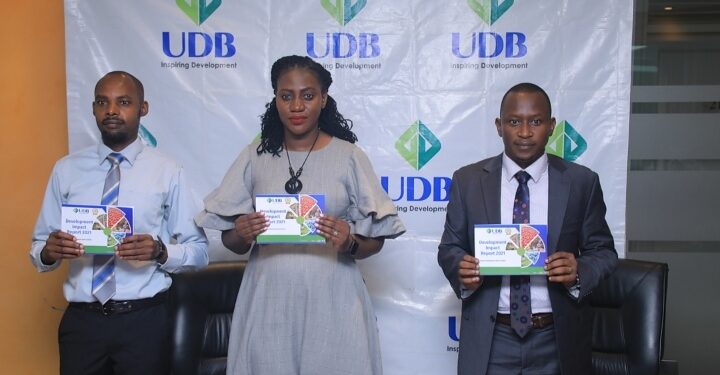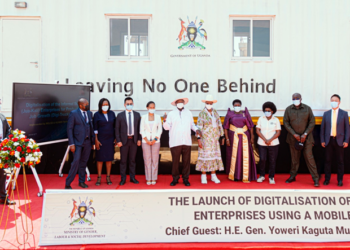The Direct Impact report by Uganda Development Bank (UDB) released on Thursday has showed that through its investments, jobs created and maintained by the financed projects grew by 72 per cent in 2021 to 41,338 jobs compared to 24,013 jobs in 2020.
The 2021 Direct Impact Report highlighted the fundamental role that the Bank continues to play toward Uganda’s sustainable socio-economic transformation and growth.
The report also showed that foreign exchange earnings grew by 131 per cent in 2021 compared to 2020. Also, a total output value of Shs 2.445 trillion was realized. This output value contributed Shs 84 billion in form of tax revenue to the government, and forex earnings of Shs 405 billion.
The share of jobs created and maintained per sector was highest in Agro-processing at 41 per cent, followed by Primary Agriculture at 30 per cent, the Manufacturing, Infrastructure, and Tourism sectors contributed 17 per cent, 6 per cent, and 3 per cent respectively while other sectors that the Bank supports, including health and education, accounted for 4 per cent.
Of the total output value reported in 2021, the Agro-processing sector contributed 42 per cent, followed by the Manufacturing sector at 33 per cent, and Primary Agriculture at 17 per cent. Other sectors contributed; Infrastructure 3 per cent Health 3 per cent, and Tourism 2 per cent.
While presenting the report during a press conference, Dr Francis Mwesigye, the Director of Economic Research and Knowledge Management at UDB said that the Bank through its investments continues to facilitate the growth of a vibrant and sustainable private sector.
The enterprises funded by UDB generated profitability amounting to Shs314Bn. By 2021, the highest profits being posted by enterprises in the Manufacturing sector which contributed 39 per cent, followed by Agro-processing at 32 per cent, and 21 per cent from the Primary Agriculture sectors respectively. The tourism and health sectors contributed 4 per cent and 2 per cent respectively.
“Of the tax contributions reported, the Manufacturing sector contributed the highest share of 45 per cent. This was followed by Agro-processing at 25 per cent, Primary agriculture at 23 per cent, and 3 per cent for both Infrastructure and Tourism respectively. The health sector contributed 1 per cent of the total share of tax revenue reported whereas the Education sector had no contribution in light of the effect of the Covid-19 pandemic lockdown measures,” Dr Mwesigwa said.
The share of foreign exchange earnings among the enterprises was highest in the Agro-processing sector at 50 per cent, followed by the manufacturing sector at 33 per cent. The health contributed 14 per cent of the forex earnings contributions.
“These results reflect the Bank’s sustained contribution to the economy, augmenting the production of essential commodities amidst the shock of the COVID-19 pandemic which affected all the sectors, increased the cost of living, and disrupted global trade and markets. This Direct Impact Report 2021 demonstrates that UDB’s presence in the economy has had an overall positive impact.
“I would like to thank our customers, with whom we partner to deliver these results. I do reiterate our commitment as UDB, to deliver our mandate by deliberately focusing our efforts on interventions that create sustainable impact, thereby improving the quality of life of Ugandans,” Dr Mwesigye added.
Gender-wise, in line with the Bank’s effort to democratize economic participation, the DI report notes positively that over 30 per cent of companies funded by UDB are owned by women.
According to Dr Mwesigye, the dedicated funding program for Women and Youth known as Special Programs launched in 2021 shall however be expanded to reinforce these targets as women and youth together constitute the most active segments in the economy as well as the most numerous.
The Direct Impact report tracks the Bank’s socio-economic footprint against its Strategic Plan and the country’s national development priorities. In addition, the Bank looks at its High Impact Goals which are aligned with engendering wholistic sustainability, inclusion, community development, and environmental protection.
The main objective of this evaluation was to track and report on progress towards the realization of the socio-economic development outcomes/impact generated by enterprises supported. The report covers the periods 2019 to 2021.
Meanwhile, UDB is the country’s national Development Finance Institution (DFI) with a mandate to accelerate socio-economic development in Uganda through sustainable financial and non-financial interventions. Consistent with this mandate, the Bank supports projects within the private sector that demonstrate the potential to deliver high socio-economic value, in terms of job creation, improved output, tax contribution and foreign exchange generation, among other outcomes.
Do you have a story in your community or an opinion to share with us: Email us at editorial@watchdoguganda.com













